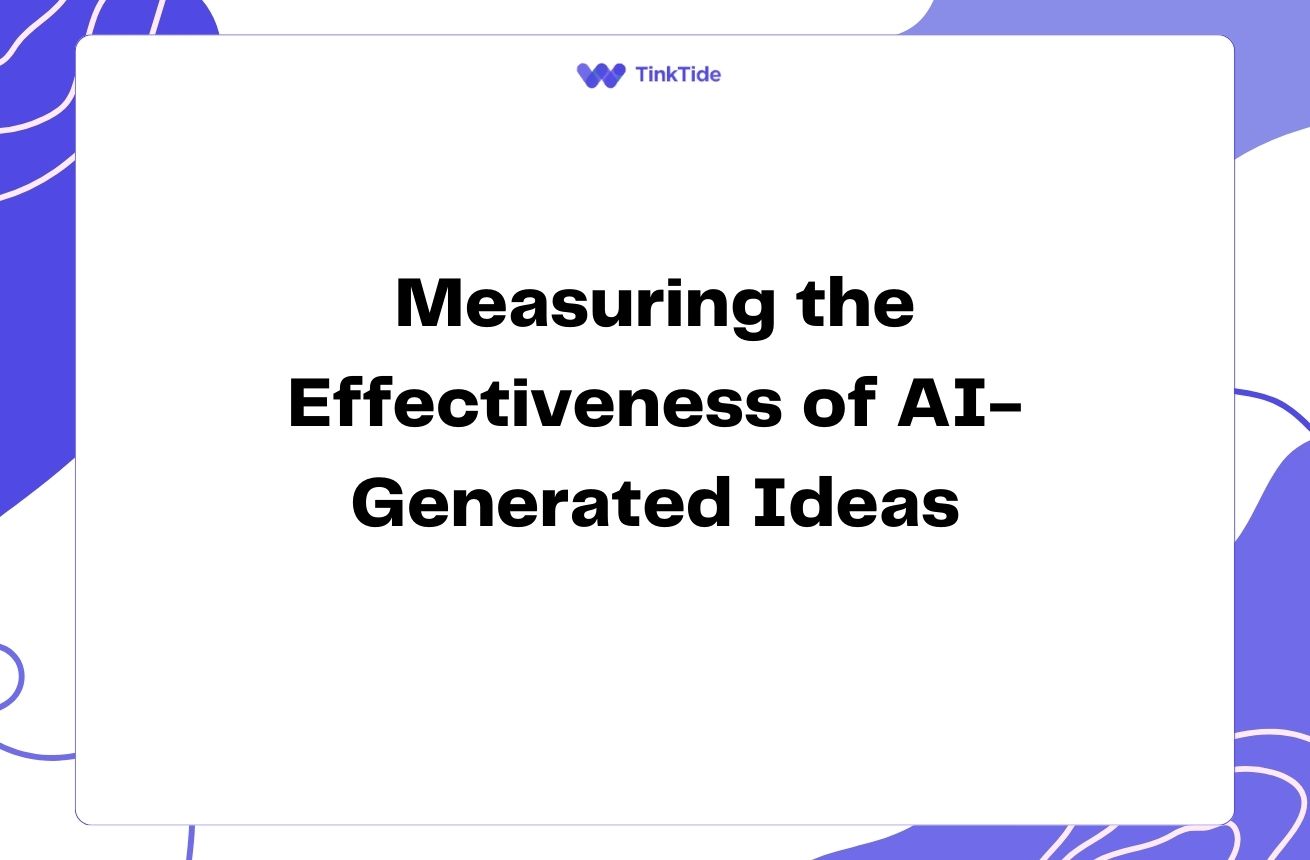Unleash Creativity: Storytelling for Idea Generation
The Power of Storytelling in Idea Generation
Storytelling is more than just entertainment; it's a powerful tool for generating and refining creative ideas. By tapping into the narrative structure, you can unlock new perspectives and innovative solutions to complex problems.
When you use storytelling techniques in your ideation process, you engage both the logical and emotional parts of your brain. This holistic approach can lead to more comprehensive and creative solutions. As noted in a Harvard Business Review article, storytelling can be a catalyst for change and innovation in various settings.
Let's explore how you can harness the power of storytelling to boost your creative thinking and problem-solving skills.
Key Storytelling Elements for Idea Generation
To effectively use storytelling in your ideation process, focus on these key elements:
- Characters: Create personas or stakeholders relevant to your problem
- Conflict: Identify the central challenge or problem to solve
- Setting: Establish the context or environment of your story
- Plot: Develop a sequence of events or potential solutions
- Resolution: Envision the ideal outcome or solution
The Hero's Journey as an Ideation Framework
The Hero's Journey, a narrative pattern identified by Joseph Campbell, can serve as an excellent framework for generating ideas. This structure can help you view problems from different angles and consider various solutions.
Start by casting your product, service, or idea as the hero. Then, guide it through the stages of the journey: the call to adventure (identifying the problem), meeting mentors (gathering information), facing challenges (overcoming obstacles), and returning with the elixir (implementing the solution).
This approach can help you identify potential pitfalls and opportunities you might have otherwise overlooked. The Interaction Design Foundation provides more insights on using narrative structures in design thinking.
Storyboarding for Visual Idea Generation
Storyboarding, a technique often used in film and animation, can be a powerful tool for visual thinkers. By sketching out your ideas in a sequence of images, you can better visualize the flow of your concept and identify areas for improvement.
To create a storyboard, divide your paper into a grid of boxes. In each box, sketch a key scene or step in your idea's implementation. This visual representation can help you spot gaps in your thinking and inspire new directions for your concept.
Remember, artistic skill isn't crucial here. Simple stick figures and basic shapes can effectively convey your ideas. The goal is to externalize your thoughts and create a visual narrative of your concept.
Using 'What If' Scenarios to Spark Ideas
'What if' scenarios are a powerful storytelling technique for generating innovative ideas. By imagining alternative realities or extreme situations, you can push the boundaries of your thinking and uncover novel solutions.
For example, ask yourself: 'What if our biggest competitor suddenly disappeared?' or 'What if our product could only be used once?' These hypothetical situations force you to think creatively and can lead to unexpected insights.
The IDEO U blog offers more techniques for innovative thinking, including the use of 'what if' scenarios in brainstorming sessions.
Collaborative Storytelling for Team Ideation
Collaborative storytelling can be a powerful tool for team ideation. By creating a story together, team members can build on each other's ideas and create a shared vision.
One effective method is the 'Round Robin' technique. Start with a problem statement, then have each team member add a sentence to the story, building on the previous contributions. This approach encourages active listening and helps team members think on their feet.
Another collaborative technique is 'Story Mapping,' where the team creates a visual representation of the user journey or product development process. This can help identify pain points and opportunities for innovation.
Steps to Implement Storytelling in Your Ideation Process
Here's a step-by-step guide to incorporating storytelling into your idea generation process:
- Step 1: Define your challenge or problem clearly
- Step 2: Choose a storytelling technique (e.g., Hero's Journey, Storyboarding)
- Step 3: Create characters or personas relevant to your challenge
- Step 4: Develop a narrative around your problem and potential solutions
- Step 5: Use the story to identify new perspectives and ideas
- Step 6: Refine and iterate on your ideas based on the narrative
Refining Ideas Through Story Editing
Once you've generated ideas through storytelling, it's time to refine them. Treat your ideas like a first draft of a story that needs editing.
Look for plot holes in your concept. Are there any logical inconsistencies or practical challenges you haven't addressed? Consider the 'character arcs' of your stakeholders. How does your idea impact them throughout its implementation?
Just as a writer might revise a story multiple times, be prepared to iterate on your ideas. Each revision can bring you closer to a more robust and innovative solution.
Address common questions
Let's address some common questions about using storytelling for idea generation:
How can storytelling improve my creative thinking?
Storytelling engages both the logical and emotional parts of your brain, leading to more holistic and innovative thinking. It helps you view problems from different perspectives and consider various scenarios, potentially uncovering solutions you might have otherwise missed.
Do I need to be a good writer to use storytelling for ideation?
No, you don't need to be a skilled writer. The focus is on using narrative structures and elements to guide your thinking, not on crafting perfect prose. Simple, clear storytelling is often more effective for idea generation than elaborate narratives.
Can storytelling techniques be used in group brainstorming sessions?
Absolutely! Collaborative storytelling can be a powerful tool for team ideation. Techniques like 'Round Robin' storytelling or creating a shared storyboard can help teams build on each other's ideas and create a collective vision.
How can I use storytelling to refine existing ideas?
Treat your existing ideas as story drafts. Look for 'plot holes' or inconsistencies in your concept. Consider the 'character arcs' of your stakeholders. How does your idea impact them throughout its implementation? This narrative approach can help you identify areas for improvement and refinement.
Are there any digital tools that can help with storytelling-based ideation?
Yes, there are several digital tools that can aid in storytelling-based ideation. Mind mapping software like MindMeister can help visualize story elements. Storyboarding tools like Boords can assist in creating visual narratives. Collaborative platforms like Miro can facilitate team storytelling exercises.
How often should I use storytelling techniques in my ideation process?
The frequency depends on your specific needs and projects. However, incorporating storytelling techniques regularly can help develop your creative thinking skills over time. Consider using these methods at the start of new projects, when facing complex problems, or when you feel stuck in your current ideation process.
Provide additional resources
The Science of Storytelling
A book by Will Storr exploring the psychology behind effective storytelling
IDEO U Course: Storytelling for Influence
An online course on using storytelling in business and design contexts
TED Talk: The Clues to a Great Story
Pixar filmmaker Andrew Stanton shares storytelling insights
Storytelling Canvas
A free tool for structuring your story-based ideation
The Hero's Journey
An in-depth explanation of the Hero's Journey narrative structure
Summarize key takeaways
Storytelling is a powerful tool for generating and refining creative ideas. By using narrative techniques like the Hero's Journey, storyboarding, and 'what if' scenarios, you can unlock new perspectives and innovative solutions.
Remember, the goal is not to create a perfect story, but to use storytelling as a framework for your thinking. It can help you consider different angles, identify potential challenges, and envision ideal outcomes.
Start incorporating these storytelling techniques into your ideation process today. You might be surprised at the creative ideas you uncover when you view your challenges through a narrative lens.
Elevate Your Ideation Process with Tinktide
Ready to take your idea generation to the next level? Try Tinktide's innovative tools for creative thinking and collaborative ideation.
Start Your Free Trial
